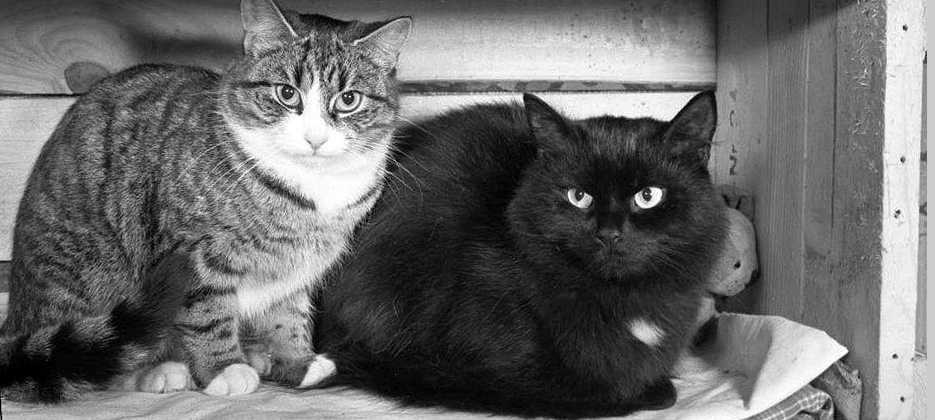How does Google know when my cat will die?

How long do cats live? Exactly 15 years says Google.com. Not “10 to 15”, not “about 15 years”, but “15 years”. That sounds like a definitive answer. It’s Google’s answer to the search query “How long do cats live”.
I am surprised by this exact value.

Where does the number come from?
First I thought: Probably it says 15 years in the Wikipedia article. But no. Google links to an article on en.wikipedia.org in another box in the search results. And there it says: A domestic cat has a life expectancy of 12 to 15 years. about.com is referenced a the sole source for this (hmmm!) According to the German magazine “Geliebte Katze” (“beloved cat”) life expectancy now stands at 15 to 20 years.
I have no idea how old cats get on average these days. The sources I could find just say that life expectancy has increased and that there are no exact empirical data on this.
The cat example is part of an ongoing chance in the basic function of search engines and other intermediaries on the net. Instead of referring to the best source material for queries they are providing information and acting as sources. Take the Google results about the average life expectancy of cats: Most users probably have enormous confidence that Google displays the most relevant results in this box above all the links. And there it is, this statement: 15 years. Without references. My guess is that many people send the high credibility Google has for search to this new kind of result – let’s call it the answer given.
It is something fundamentally different: One answer, no references instead of many answers people have to find themselves in the referenced websites. With traditional search results you can compare the listed sources, assess their credibility yourself and perhaps even question Google’s judgement on the relevance of certain results. You cannot do that with an answer give like “15 years”.
I believe that this type of results will increase. Some reasons for this: Technology companies spend on interfaces like Siri, Cortona or Google Now and databases behind them. The predominance of mobile phones. The possibilities to monetize a central, closed mobile platform like these assistants what WeChat demonstrates now in China.
And we still have no idea why an average cat has only “15 years” to live according to Google. Unlike the list of search results this kind of presentation does not show the diversity of often contradictory sources.
If you use “goat lifespan” as a search query, the given answer looks a bit different: 15-18 years. This information could come from a Wikipedia article, which gives a source for the 15-18 years: The “Handbook of Biological Data” from 1956. I do not know if the life expectancy of goats hasn’t changed in the last 60 years and if there really is such a thing as THE life expectancy of ALL types of goats.

Perhaps Google’s Knowledge Graph really know all this and comes to the conclusion that 15-18 years sums up all current knowledge on the life expectancy of goats. Here is another interesting theory on how Google comes to give that answer by The Verge. The author of the article on Google and goats writes based on a conversation with the Knowledge Graph product manager Emily Moxley:
“There’s no specific place so did Google trusts as a source for actor information, or animal information. It’s just that you look for lengths of When Time That are associated with “goat + lifespan,” they tend to fall between 15 and 18 years. It’s ambient data, coming from everywhere and nowhere. If you get enough of a consensus, it turns into something that looks an awful lot like a fact. ”
This could also be true.
One explanation that brings both theories together: Maybe lot of people write that goats live 15-18 years on their websites based on information from the English Wikipedia, which come from a handbook from 1956. That value appears in Google’s answer as valid knowledge on the life of goats – without any reference and although the data is more than half a century old (if Google’s information is somehow based on the “Handbook of Biological Data” from 1956.
For English terms Google delivers a definition on top of its search results as own content without any references. But here is quite easy to find the sources of the definitions – you simply use the given definition as a search term. Doing this you find, then Google prefers a certain definition of the term transgender form the Oxford Dictionary to all other possible (and quite different!) ones:
“Denoting or relating to a person Whose self-identity does not conform unambiguously to Conventional notions of male or female gender.”

Why this definition? Is it better, more relevant or something else than all other definitions from Collins, Merriam-Webster, Macmillan, Wiktionary, Wikipedia? Or has the use of this definition nothing to do with the quality of the content, but is it based on something else? Contracts with certain copyright holders that allow Google to use content from dictionaries without giving reference? I have no idea. No one has who sees this boxes with certain definitions above search results.
In case of the “tennis elbow” the definition of the “Oxford Pocket Dictionary of Current English” from 2009 seems to be superior to all other dictionaries.
The life expectancy of cats, goats and word definitions may be dismissed as trifles. Why should anyone care, where the answers given by Google here are coming? The content is good enough and not far off the mark. Isn’t it? I do not know. I have no idea, if there really is an exact answer to certain questions. What I see as a problem is that users have no way to learn where the given answers are coming from. That is important when people start asking their digital assistants (formerly known as search engines) about something else than cats and goats. Like for health advice. For example: how to lose weight?
In response to this questions Google show a to-do-list with eight points above the results. It comes from a site called Dietdoctor.com and starts with interesting advice:
“1. Choose a low-carb diet. If You Want To Lose Weight You Should Start by Avoiding sugar and starch (like bread). ”
Why is this information highlighted and presented so prominently? I have no idea. All I know is that the superiority of low-carb diets is debatable and debated. I think: If a publication gives answers, the sources should always be transparent. And if there is no clear answer, the answer should be: It’s complicated. And not: “15 years!” Or: “low carb!”

German version here.
Published under CC BY-ND 3.0, author is Konrad Lischka, please link to: http://www.konradlischka.info/b/1o1


